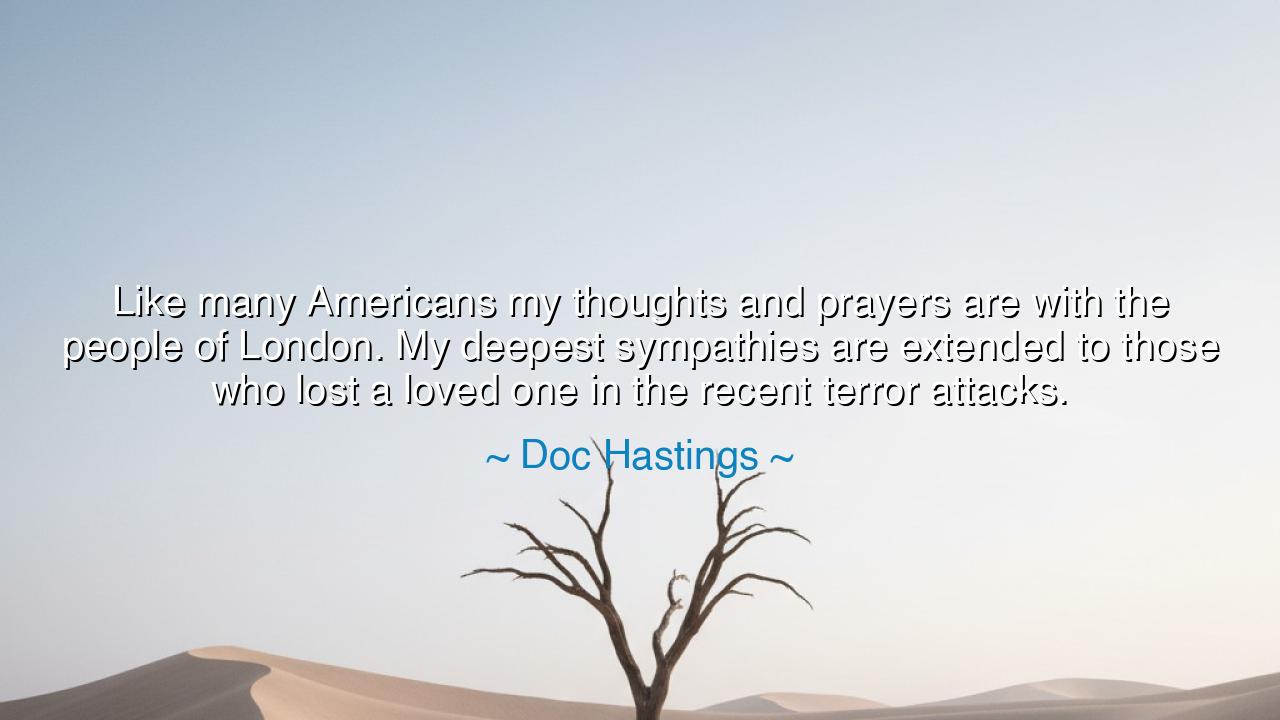
Like many Americans my thoughts and prayers are with the people
Like many Americans my thoughts and prayers are with the people of London. My deepest sympathies are extended to those who lost a loved one in the recent terror attacks.






"Like many Americans my thoughts and prayers are with the people of London. My deepest sympathies are extended to those who lost a loved one in the recent terror attacks." These words by Doc Hastings are an expression of empathy, solidarity, and human connection in the face of a tragedy. They are the words of a man reaching out to those in pain, to offer his sympathy and support in times of darkness. The act of offering thoughts and prayers is a powerful gesture that speaks to the universal human need to share in the suffering of others, to acknowledge the depth of loss and to affirm that even in the most uncertain of times, community and compassion remain paramount.
The context of this statement is the tragic events of the terror attacks in London, a moment in history where the world witnessed the destruction and loss of innocent lives. These are moments that test the very core of humanity, where people are left to grapple with the deep questions of violence, loss, and human fragility. For those who suffer the loss of loved ones, words often seem inadequate, yet the offering of sympathy and prayers is a gesture that speaks beyond words, reaching into the hearts of those who are grieving. It is a reminder that even when the world feels divided and fractured, there are still those who reach out, offering not just condolences, but the hope that through compassion and solidarity, healing can begin.
History has shown that humanity is often at its most vulnerable in the face of senseless violence. Yet, it is in these moments of suffering that the deepest reservoirs of human strength and resilience are revealed. The London terror attacks, much like the countless tragic events in history, serve as a reminder of how fragile life is, and how, in times of crisis, the world must come together to stand against the forces that seek to divide and destroy. Consider the aftermath of the 9/11 attacks in the United States, where a nation, reeling from unimaginable loss, responded not with division, but with a profound sense of unity and resolve. Citizens, leaders, and nations reached out to one another, offering prayers, support, and, above all, solidarity. It was a time when the human spirit was tested, but not broken.
In such moments, it is easy to feel helpless, to question the purpose of offering mere words when the magnitude of loss seems beyond measure. But, as the ancients have taught us, the act of sharing in another's grief, of offering sympathy, is an act of profound courage. It acknowledges the shared bond of humanity, the unspoken understanding that we are all connected, and that no one should have to bear their pain alone. This shared grief is what fuels the resilience of communities. From the ashes of tragedy, new forms of strength and compassion emerge, and it is through this collective action that societies heal.
The lesson from Hastings’ words is one that is both simple and profound: in the face of violence and loss, our thoughts, prayers, and acts of sympathy are not mere rituals but are vital expressions of solidarity. They serve as reminders that even in our most vulnerable moments, we must not lose sight of the power of human connection. When words seem inadequate, our presence, our compassion, and our support become the most meaningful gifts we can offer. These gestures transcend borders, reaching out to those in need, affirming that no tragedy is ever borne alone.
In practical terms, this lesson calls on each of us to take active steps in cultivating compassion in our lives. It is easy to stand on the sidelines and send our thoughts and prayers in the wake of tragedy, but the true measure of our humanity lies in what we do next. Do we seek to reach out to those who have been affected, even in small ways? Do we engage in efforts that help rebuild, heal, and support? In the face of loss, there is power in action—whether it be offering a listening ear, providing material aid, or working towards a future where such violence is eradicated. Through these actions, we ensure that our thoughts and prayers are not hollow, but are followed by deeds that bring comfort and strength to those who need it most.
Thus, the true power of empathy lies in the combination of words, thoughts, and actions. Sympathy must be seen not only as a gesture, but as a call to action. When we offer our prayers, we must also ask ourselves: What can I do to help? How can I stand in solidarity with those who suffer? By answering these questions, we honor the lives lost and continue the work of healing, building a world that is united, compassionate, and resolute in the face of tragedy.






AAdministratorAdministrator
Welcome, honored guests. Please leave a comment, we will respond soon